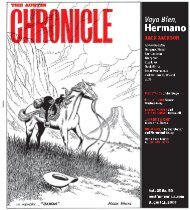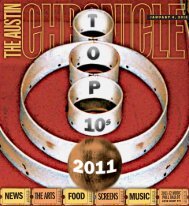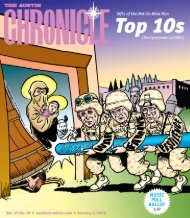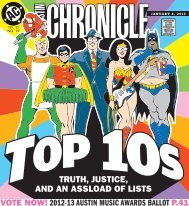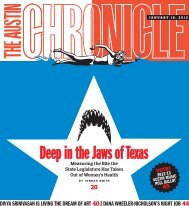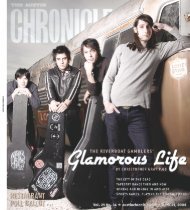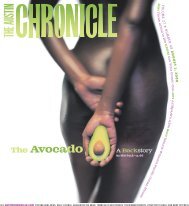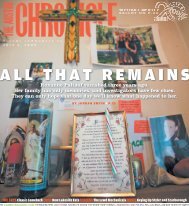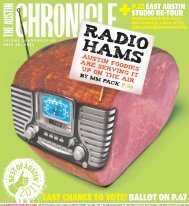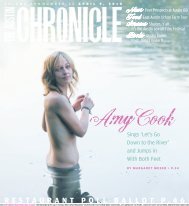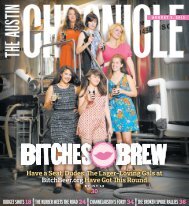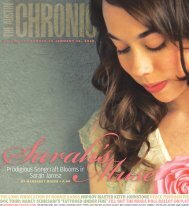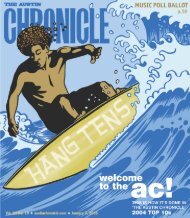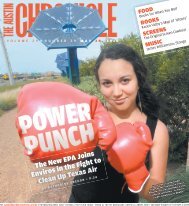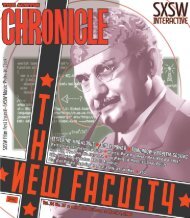March 27, 2009 - The Austin Chronicle
March 27, 2009 - The Austin Chronicle
March 27, 2009 - The Austin Chronicle
You also want an ePaper? Increase the reach of your titles
YUMPU automatically turns print PDFs into web optimized ePapers that Google loves.
THE ARTSResearch and DevelopmentBack in the performance laboratory of the David Mark Cohen New Works FestivalBY ROBERT FAIRESExpect sparks in the Winship Drama Building this coming week.As has happened there every other spring since 2001, the Universityof Texas Department of <strong>The</strong>atre & Dance is hosting the David MarkCohen New Works Festival, and so much creative experimentation willbe taking place – more than 30 projects this year, covering theatre,ballet, contemporary dance, cabaret, film, theatrical design, musicaltheatre, and mash-ups of two or more of the above – that friction isinevitable and fireworks quite likely.This will be the fifth edition of the festival, named in honor ofthe influential playwright, critic, and educator who did so much tochampion new work as head of the department’s playwriting programfrom 1990 until his death in 1997. Part of Cohen’s legacy nowis this intense biennial exercise in experimentation, with the entiredrama building and its immediate environs becoming a laboratory forperformance, with directors, designers, choreographers, composers,dancers, actors, musicians, playwrights, videographers, technicians,and dramaturges conducting research into what is possible in drama,in dance, in telling stories and not telling them, in fusing disciplines,in collaboration.“<strong>The</strong> spirit of collaboration and excitement that I witness in the playwrightsand artists, as they support and help create each other’s work,is always inspiring,” says playwright Sherry Kramer (When SomethingWonderful Ends, David’s Redhaired Death), a participant in previousfestivals. “It’s like you can actually see the spirit of performance inmaterial form.” She believes the size, interdisciplinary approach, andinclusiveness of UT’s festival make it unique on the festival landscape.“While some events are higher production values than others, there isa democratic aspect about the sheer variety of events that makes everythingequal,” Kramer notes. “Each event is what it is.”“What distinguishes NWF from other festivals is the same intangiblequality that helps a script in development: optimism!” That’sSuzan Zeder, who succeeded David Mark Cohen as head of the department’splaywriting program and has been co-producer of the festivalwith dance professor David Justin and department producing directorDenise Martel. Zeder says that the three of them, along with every studentand faculty member of the festival committee, “try to treat eachcreative team with the respectand rigor that it deserves. <strong>The</strong>investment of money is not verygreat in terms of production.<strong>The</strong> promise of critical recognitionis not likely, since mostprojects are not even reviewedindividually. <strong>The</strong> real investmentis an act of faith, that eachproject, play, piece of creativework will have a life-changingeffect on its creators, and thatis priceless.”This year, Zeder will have adramatically different role inthe festival. After four runs asproducer, teacher, and midwifeto other writers’ plays, she willbe giving birth to one of herown in the festival. For the pastyear, Zeder has been hard atKENNY BRAUNSuzan ZederMeg Rushing in Look, Listen, Look Again!<strong>The</strong> spirit of collaboration at the NewWorks Festival is so strong, saysplaywright Sherry Kramer, “it’s likeyou can actually see the spirit ofperformance in material form.”work on the conclusion to a trilogy that began with what may be hermost produced and acclaimed play, Mother Hicks, a drama of outcastsin a small town in Illinois during the Great Depression. A prequel, <strong>The</strong>Taste of Sunrise, told another story of the town, Ware, in the 1920s.Now Zeder is finishing the Ware Trilogy with <strong>The</strong> Edge of Peace, whichtakes the town into the last days of World War II and shows a family’sstruggle with the possible loss of a son in the great conflict. <strong>The</strong>play has already been through two workshops with Seattle Children’s<strong>The</strong>atre, which commissioned it, and will be further developed at theAsolo Repertory <strong>The</strong>atre in Sarasota, Fla., following Zeder’s writingresidency at the Hermitage retreat, but “none of these venues will giveme what the New Works Festival will provide: a chance to stand on anequal footing with my students and learn from them and to bring thiswork in its formative stages to children and adults, deaf and hearingaudiences.” Zeder wants from the festival “exactly the same chanceand gamble it gives to every student courageous enough to bring hisor her best work to the table: a place to make something new, a timeto take the first step, an audience to see it and hear it for the first time,and the belief that at the end of the day, someone will care.”If the festival’s prior editions are any indication, finding someoneto care will not be a problem. It was from the festival that some ofthe most remarkable original scripts of the past decade first saw light,and the strong response there helped propel them toward more fullyrealized productions: Steve Moore’s Nightswim, Carson Kreitzer’s Fleshand the Desert, Dustin Wills’ Ophelia, Ryan Pavelchik’s Static, GeorgeBrant’s Elephant’s Graveyard, Eve Tulbert’s Ashes, Ashes. UT’s biennialperformance lab offers us an opportunity to discover more works likethese in an environment supercharged with inventiveness and enthusiasm.“Basically, until they invent the warp drive and time travel,” saysKramer, “the New Works Festival is pretty much the best way I knowto walk through 20 or 40 doors into other worlds in one building in aweek … and what’s not to like about that?”COURTESY OF J. ELISSA MARSHALLA GUIDE TO THE WORKSThis year’s New Works Festival runs for six days,with performances beginning at 10am each day andending by 11pm. Works are being performed in avariety of spaces around the Winship DramaBuilding, 23rd and San Jacinto, some of them quitesmall and able to seat only 15 to 50 people, so it’sa good idea to arrive early if you want to be assureda seat.Thanks to sponsorship from the University Co-op,all performances and events are free. For more info,visit www.coopnwf.org. Descriptions provided byUT’s Department of <strong>The</strong>atre & Dance.101 Ways To …written and performed by Jenny Connell, Tim Longo,Carra Martinez, Steve Moulds, and Sarah Myers;created and directed by Halena KaysHigh-energy, physical theatre extravaganza usingthe world of women’s fashion magazines as itsinspiration. Mature content. (90 min.) Brockett<strong>The</strong>atre, Tuesday, noon; Wednesday, 5:30pm;Friday, 5:30pm.Autopilotby Anna Fugate and Ashley HayesFour relationships facing the same problem: “<strong>The</strong>course of true love never did run smooth.” Maturecontent. (60 min.) Winship 1.134, Monday, 1pm;Tuesday, 9:30pm; Friday, 11am; Saturday, 4pm.Chest Scaledesigned by Sarah Lankenau; aided by SarahThornell; curated by Jenna Penick; documented byMichael HowellHanging installation that looks back through 150years of pattern drafting for tailored menswear.Winship atrium, Monday-Saturday. Reception:Monday, 2:30pm, Winship upper atrium.Dream Sequenceconceived and directed by Fadi SkeikerA performance based on the dreams of the castusing a process that was improvisational. (90 min.)Winship 2.180, Monday, 8pm; Tuesday, 11am;Wednesday, 3pm; Friday, 12:30pm.<strong>The</strong> Edge of Peaceby Suzan Zeder; directed by Wendy BableIn the final months of World War II, a local boy isdeclared MIA, and his younger brother refuses tobelieve what seems inevitable. (90 min.) Lab<strong>The</strong>atre, Monday, 4:30pm; Tuesday, 6pm (AmericanSign Language interpreted); Wednesday, 10am.Fernando and the Killer Queenby Kyle John Schmidt; directed by Elizabeth C. LayIn a bloody fantasyland wracked by revolution, aqueen fights to keep her government. Maturecontent. (60 min.) Lab <strong>The</strong>atre, Wednesday, 9pm;Thursday, 6pm; Friday, noon; Saturday, 1pm.Foodstuffby Meghan Kennedy; directed by Erin Meyer & NoelGaulinWork exploring identity through a ritual we all takepart in every day: eating. Mature content. (60 min.)Winship 1.134, Monday, 7:30pm; Tuesday, 7pm;Friday, 6:30pm.Footprints: A Musical Eco-Talebook by Lindsay Genshaft; music/lyrics by JenniferHartmann with Lindsay GenshaftStaged reading of a musical for young audiencesabout a young girl’s quest to save a forest. (90 min.)Payne <strong>The</strong>atre lobby, Monday, 8pm; Tuesday, 2pm;Thursday, 6pm; Friday, 1:30pm.Funky Snowmanby Wendy Bable; music by Michael Bowman;directed by Brian C. Fahey; choreographedby Molly SearcyA play/ballet for young people in which littleFritzie brings a groovalicious snowman to life. (60CONTINUED ON P.3836 T H E A U S T I N C H R O N I C L E MARCH <strong>27</strong>, <strong>2009</strong> a u s t i n c h r o n i c l e . c o m



